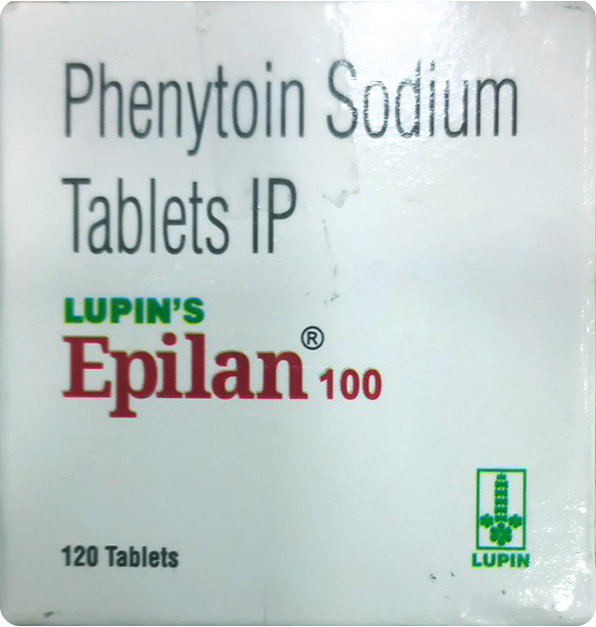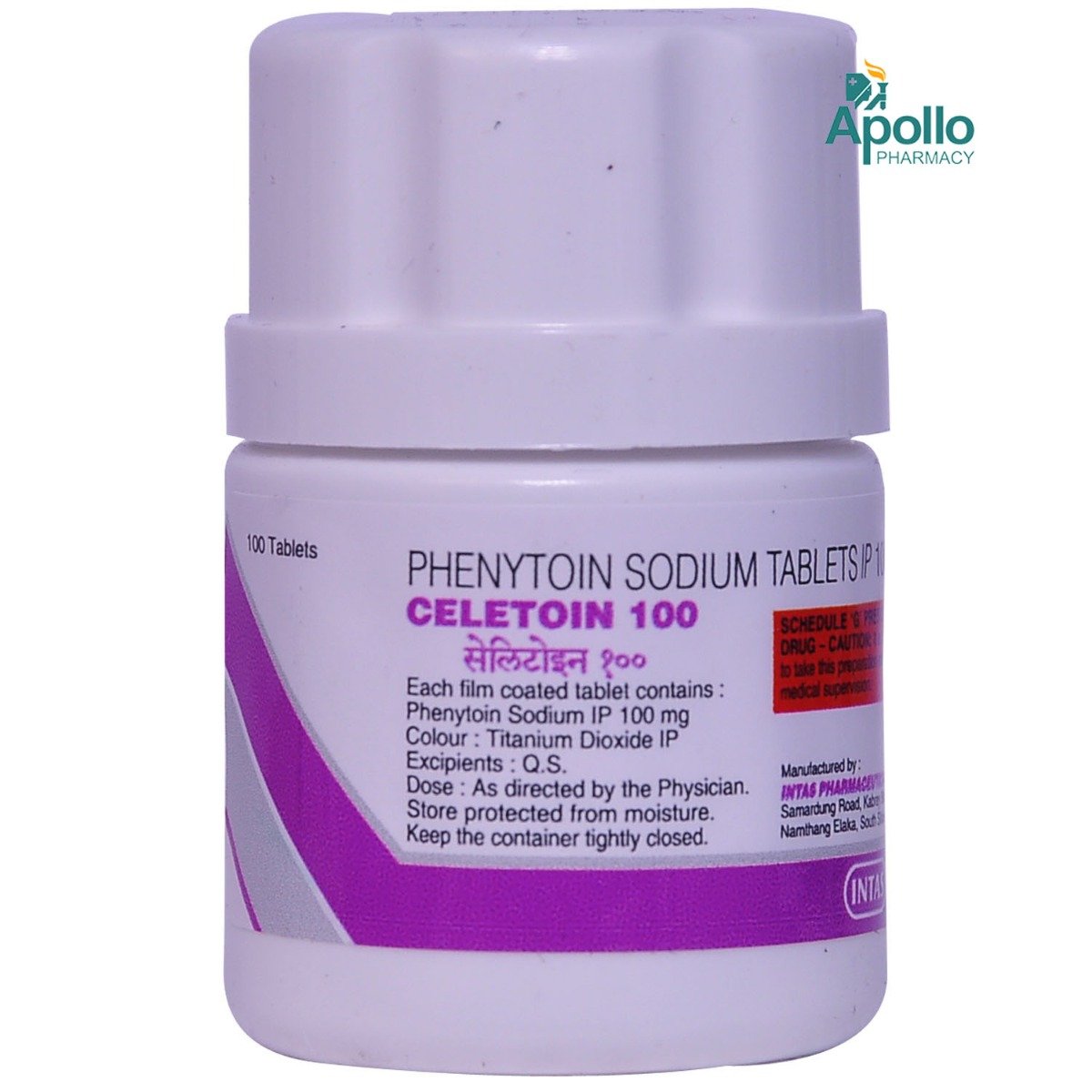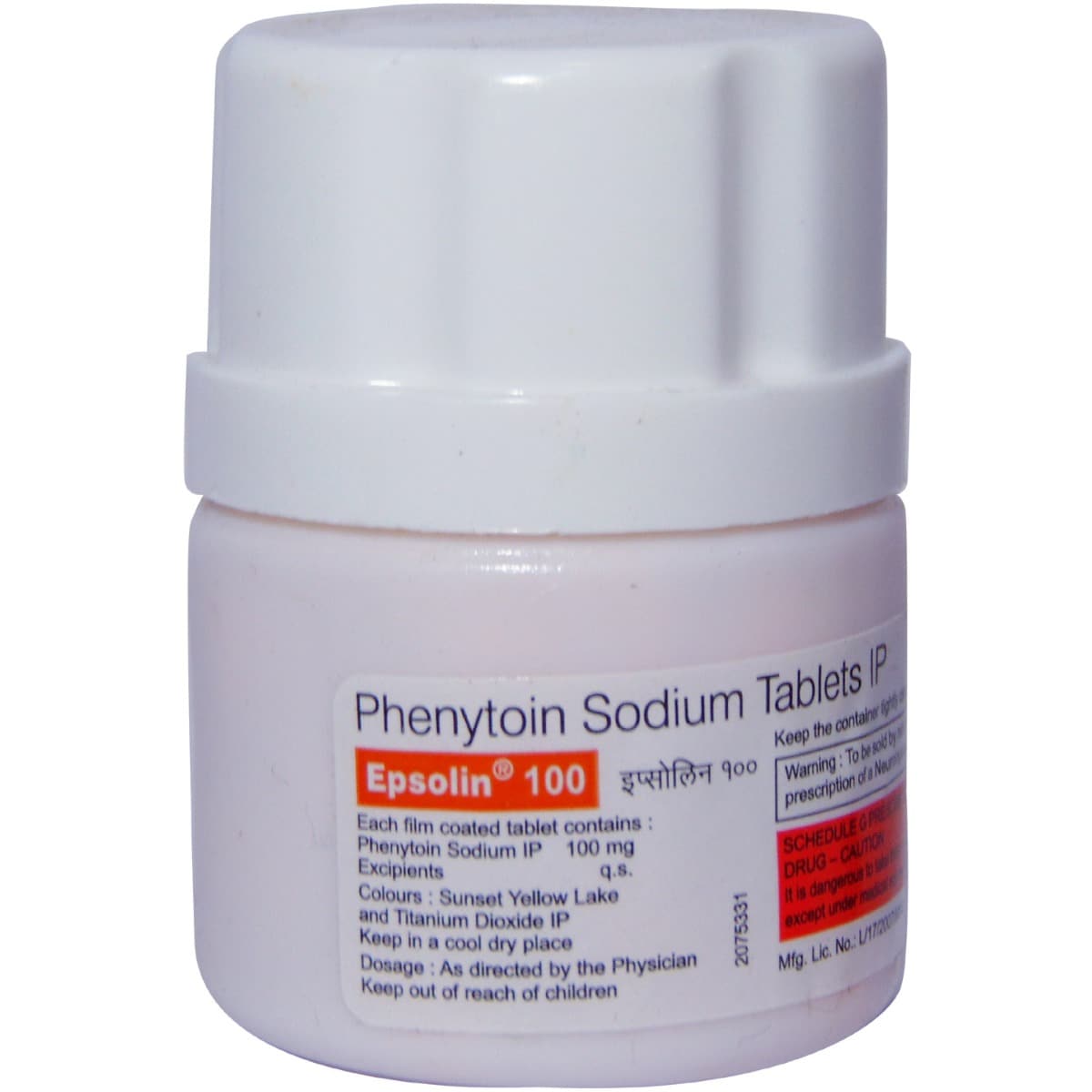- Home
- Phentoin 100mg Tablet
Phentoin 100mg Tablet Substitute
Phentoin 100mg Tablet Substitute
Medicine Composition:
PHENYTOIN-100MGAll Substitutes & Brand Comparisons
RX
Out of StockCtoin 100 mg Tablet 90's
USV Pvt Ltd
₹16.8
(₹0.17 per unit)
87% CHEAPERRX
Out of StockMarantin 100mg Tablet
₹10.6
(₹0.95 per unit)
30% CHEAPERRX
Out of StockChiktoin 100mg Tablet
₹15
(₹1.35 per unit)
1% CHEAPERRX
Out of StockFonita 100mg Tablet
₹15.7
(₹1.41 per unit)
2% COSTLIERRX
Out of StockKiptoin 100mg Tablet
Kivi Labs Ltd
₹157.92
(₹1.42 per unit)
3% COSTLIERRX
Out of StockAbolin 100mg Tablet
Shalman Pharma Pvt Ltd
₹163
(₹1.47 per unit)
7% COSTLIERRX
Out of StockAtoin 100mg Tablet
₹147.06
(₹1.47 per unit)
7% COSTLIERRX
Epsod 100mg Tablet 60's
Shine Pharmaceuticals Ltd
₹102.5
(₹1.54 per unit)
12% COSTLIERRX
Eptoin 100 Tablet 120's
Abbott India Ltd
₹225.5
(₹1.65 per unit)
20% COSTLIERRX
Epilan 100 Tablet 120's
Lupin Ltd
₹221.5
(₹1.66 per unit)
21% COSTLIERRX
Protoin 100 Tablet 10's
Sigmund Promedica
₹18.5
(₹1.67 per unit)
21% COSTLIERRX
M-Toin 100mg Tablet 10's
Medopharm Pvt Ltd
₹18.5
(₹1.67 per unit)
21% COSTLIERRX
Celetoin 100 mg Tablet 100's
Intas Pharmaceuticals Ltd
₹187.5
(₹1.69 per unit)
23% COSTLIERRX
Epsolin 100 Tablet 100's
Zydus Cadila
₹187.5
(₹1.78 per unit)
29% COSTLIERRX
I-Toin 100 Tablet 100's
Ikon Pharmaceuticals Pvt Ltd
₹178
(₹1.78 per unit)
29% COSTLIER

When Should You Consider Switching from Phentoin 100mg Tablet?
Patients may explore substitutes in the following scenarios:
- High monthly cost of Phentoin 100mg Tablet
- Non-availability in local pharmacies
- Generic recommendation by a doctor
- Side effects or better tolerability with alternatives
What to Know Before Switching
Before you switch from Phentoin 100mg Tablet to another medicine, here are some important points to keep in mind:
Same salt, different brands:
Most substitutes contain the same active ingredient - PHENYTOIN-100MG, but the fillers, coating, or manufacturing quality may vary slightly.
Consult your doctor first:
Even if the salt is the same, your doctor can confirm if the substitute is right for your condition, dosage, and health history.
Watch out for allergies or reactions:
Some people may react differently to certain brands due to inactive ingredients. If you notice any side effects, inform your doctor immediately.
Price ≠ effectiveness:
A lower-priced substitute doesn't mean it's less effective. Many generic medicines work just as well as branded ones.
Check the dosage form and strength:
Always match the substitute’s strength (e.g., 5mg, 10mg) and form (tablet, capsule, syrup) with what your doctor prescribed.
Uses
Phentoin 100mg Tablet is used in the treatment of epilepsy/seizures and trigeminal neuralgia. The detailed uses of Phentoin 100mg Tablet are as follows:
- Management of Epilepsy/Seizures: Phentoin 100mg Tablet is primarily used to control various types of seizures in patients with epilepsy, such as complex partial (psychomotor) seizures and tonic-clonic seizures. It helps to reduce the frequency of these seizures.
- Long-term Seizure Management: Phentoin 100mg Tablet is often used as part of a long-term strategy for managing epilepsy, allowing individuals to maintain better seizure control over time and improve their quality of life.
- Short-term Prevention of Seizures: Phentoin 100mg Tablet is also used to prevent seizures before/during/after brain surgery, as well as following a traumatic brain injury (head injury).
- Managing Trigeminal Neuralgia: Phentoin 100mg Tablet may be used to reduce pain episodes in patients with trigeminal neuralgia by stabilizing nerve impulses.
Medicinal Benefits
Phentoin 100mg Tablet belongs to the group of anticonvulsant medicines called 'hydantoins' used to treat epilepsy/seizures. Phentoin 100mg Tablet is also used to control and prevent fits during or after a severe head injury or brain surgery. Phentoin 100mg Tablet works by controlling the overactivity of the brain cells that cause seizures (fits). Thereby, Phentoin 100mg Tablet helps in controlling epileptic fits involving spasms of the muscles and jerking. Phentoin 100mg Tablet may also be used to treat trigeminal neuralgia (facial nerve pain). Phentoin 100mg Tablet slows down the electrical impulses in the nerves and reduces their ability to transmit pain. Thereby treating trigeminal neuralgia.
FAQs
The substitutes of Phentoin 100mg Tablet contain the same active salt(s) - PHENYTOIN-100MG. However, they may differ in price, manufacturing quality, and inactive ingredients. Speak to your doctor to find a suitable option.
Switching to a generic substitute medicine in the place of Phentoin 100mg Tablet is often possible if it has the same salt, strength, and dosage form. But always check with your doctor before making any changes to your medication.
Generics versions of Phentoin 100mg Tablet are typically more affordable because they don’t include the original brand's research, development, and marketing costs. They contain the same active ingredient and are approved for safety and effectiveness.
Most people don’t notice any difference. However, some may react to different fillers or coatings. If you notice any unusual symptoms after switching, consult your doctor.
Make sure the new medicine has the same active salt, strength, dosage form. Always confirm the change with your doctor or pharmacist.
Substitutes of Phentoin 100mg Tablet meet the same safety and efficacy standards as Phentoin 100mg Tablet, but small differences in absorption or formulation can exist. A doctor can help you choose the right one for your needs.
Yes. Substitutes of Phentoin 100mg Tablet may vary in color, size, or shape due to differences in manufacturing and branding, but this does not affect how they work.
Yes, it’s generally safe to switch between multiple substitutes of Phentoin 100mg Tablet if they have the same salt and strength. However, always inform your doctor so they can monitor how your body responds.
Yes, many people safely use substitutes of Phentoin 100mg Tablet for long-term treatment. Just ensure it’s done under medical supervision.
If your symptoms stay under control or lab results remain stable, the substitute for Phentoin 100mg Tablet is likely working well. Regular follow-ups with your doctor are important.
Absolutely. Even with the same salt, small differences can affect how your body responds when switching from Phentoin 100mg Tablet to its substitute. Always consult your doctor before switching.
Phentoin 100mg Tablet is used to treat epilepsy/seizures and prevent seizures during/after brain surgery or after traumatic brain injury. Besides this, Phentoin 100mg Tablet may also be used to treat trigeminal neuralgia (facial nerve pain).
Phentoin 100mg Tablet contains Phenytoin (an anticonvulsant), which helps prevent neurons from working at a very fast speed, thereby preventing the brain cells from firing together rapidly in an uncontrolled way. As a result, Phentoin 100mg Tablet controls the overactivity of the brain cells that cause seizures. Phentoin 100mg Tablet slows down the electrical impulses in the nerves and reduces their ability to transmit pain, thereby treating trigeminal neuralgia.
Phentoin 100mg Tablet can make birth control pills less effective. Talk to your doctor about using non-hormonal contraceptives like condoms and a diaphragm with spermicide to prevent pregnancy.
Please do not stop taking Phentoin 100mg Tablet without consulting your doctor, as it may cause increased seizures. Continue taking Phentoin 100mg Tablet for as long as your doctor has prescribed it to you. Do not hesitate to consult your doctor if you experience any difficulties while taking Phentoin 100mg Tablet.
Yes, Phentoin 100mg Tablet may cause swelling in the gums. Brush and floss your teeth daily; visit your dentist if you experience this problem regularly.
Phentoin 100mg Tablet may affect the breakdown of the blood sugar/glucose and may prevent the release of insulin, thereby leading to high blood sugar. So, contact a doctor before using Phentoin 100mg Tablet if you have diabetes.
A seizure generally lasts from a few seconds to a few minutes, depending on the type of seizure.
Take Phentoin 100mg Tablet with or without food, as advised by your doctor.
You are recommended to avoid alcohol consumption while taking Phentoin 100mg Tablet as it may cause increased side effects.
Phentoin 100mg Tablet may stay in our system (body) for 5 to 6 days on average. This duration is different for each person. In some cases, it may remain for about 9 to 10 days.
Phentoin 100mg Tablet overdose can be fatal and may cause symptoms such as slurred speech, twitching eye movements, muscle stiffness or weakness, tremors, loss of balance, lightheadedness, fainting, vomiting, nausea, and slow or shallow breathing. Also, it may cause very low blood pressure and even coma. Therefore, do not exceed the recommended daily dose.
Patients with liver disease, particularly if they have a history of developing a liver problem due to Phentoin 100mg Tablet should avoid taking Phentoin 100mg Tablet. Additionally, anyone taking Delavirdine (a medicine used in the treatment of HIV infection) should not take Phentoin 100mg Tablet as it may reduce the effectiveness of Delavirdine against HIV and the virus may also develop resistance to Delavirdine. It is advised to inform your doctor before taking Phentoin 100mg Tablet if you have any existing heart problem.
You are recommended to consult your doctor before taking Phentoin 100mg Tablet with ibuprofen or other medicines to avoid drug interactions.
The most common side effects of Phentoin 100mg Tablet in children are overgrowth of the gums and jerky movements of the eyes (nystagmus). In some children, it causes problems with behaviour or thinking, mood change, loss of energy and slow or clumsy movements. High doses may cause side effects such as vomiting, sleepiness and unsteadiness in the feet and hands. To avoid these, the dose is increased gradually. As soon as the dose is reduced, these side effects disappear.
Phentoin 100mg Tablet does not cause weight gain. However, on longer term use of a higher dose of Phentoin 100mg Tablet, weight loss can occur. If you experience weight gain after taking Phentoin 100mg Tablet, please consult your doctor.
Phentoin 100mg Tablet can make you feel sleepy as a side effect. However, if you feel extremely sleepy after taking Phentoin 100mg Tablet, especially in the first few weeks of treatment or after a dose increase, please consult your doctor.
The common side effects of Phentoin 100mg Tablet include weakness, drowsiness, dizziness, confusion, restlessness, slurred speech, constipation, loss of coordination, and abnormal eye movement. Most of these side effects do not require medical attention and will resolve gradually over time. However, you are advised to talk to your doctor if you experience these side effects persistently.








